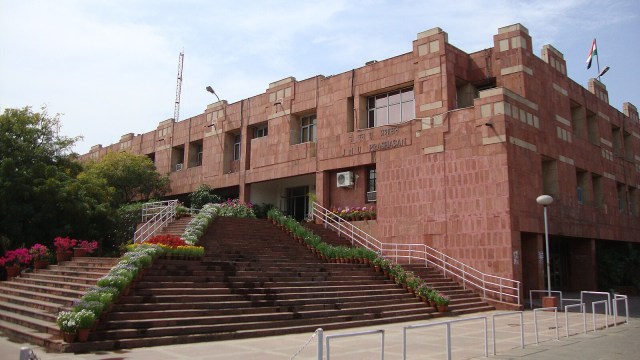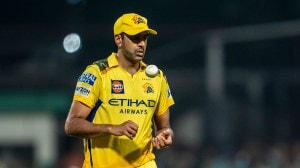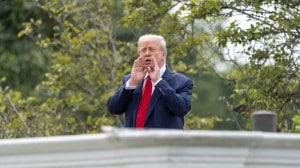JNUSU election: From Pahalgam to Palestine, spirit of student politics marks presidential debate
The JNUSU election will be held tomorrow after a delay over “major lapse of security” and an “environment of hostility, fear, and insecurity”.
 Voting for the JNUSU polls commenced at 9 am today. (File Photo)
Voting for the JNUSU polls commenced at 9 am today. (File Photo)As dusk gave way to darkness on Wednesday, the air over Delhi’s Jawaharlal Nehru University (JNU) grew thick, not just with dust kicked up by dancing feet and ceaseless drum beats, but with tension, slogans, and the spirit of the students’ union elections.
Under yellow lights strung across the campus lawns and amid rising chants that echoed from hostels to the Ganga Dhaba, the most-awaited ritual of the JNUSU election, slated for Friday, April 25, unfolded — the presidential debate.
It began, however, not with confrontation but silence.
The Election Committee (EC), ahead of the debate, requested a two-minute silence to mourn the terror attack in Pahalgam that left 26 dead on Tuesday. And so, in a rare moment of unity, student leaders, candidates, and hundreds in the crowd bowed their heads even as Palestinian and Israeli flags fluttered from opposite ends of the audience.
A divided ‘red’ bloc
This year, the rupture between the Students’ Federation of India (SFI) and All India Students’ Association (AISA) meant that for the first time in several election cycles, the “red” wasn’t a unified bloc. Instead, its fragments sat scattered across the grounds, leaving enough gaps for the saffron to march through. And the Akhil Bharatiya Vidyarthi Parishad (ABVP), sensing this split, seized the moment.
For the first time in nearly a decade, the SFI and the AISA are fielding separate candidates after a breakdown in alliance talks. The fallout, primarily over disagreements on the presidential nominee and the inclusion of the Birsa Ambedkar Phule Students’ Association (BAPSA) in a coalition, has not only fractured the traditional Left Unity but also opened the door for the ABVP to potentially increase its vote share.
A forced pause
But JNU has never been a quiet place during elections. The chaos, in a way, is the celebration.
As speeches began, slogans collided. AISA and SFI activists chanted over the ABVP’s candidate. ABVP volunteers banged dholaks and metal plates when Left-backed speakers took the stage.
The most dramatic interruption came during Choudhary Tayyaba Ahmed’s speech, standing as the face of the SFI-BAPSA-All India Students’ Federation (AISF)-Progressive Students Association (PSA) alliance, she was forced to pause for at least 10 minutes as ABVP supporters clanged metal lids.
“I am not afraid of you. I will keep standing right here until you let me finish,” Choudhary said when she finally resumed. “This is the ABVP that held the EC hostage, and yet here we are. Still standing.”
During her speech, Choudhary hit out at what she called “Sanghi forces” for targeting marginalised groups and invoked the dismantling of the Gender Sensitisation Committee Against Sexual Harassment (during earlier regimes). “They don’t want us to speak. They don’t want us to study. But we are still here, for gender and social justice.”
Ideological divide and local issues
Others followed in similar tones, though each with their own focus.
Pradeep Dhaka, the Congress-backed National Students’ Union of India (NSUI) candidate, theatrically held up a copy of the Constitution, and declared: “This country will be run by Ambedkar’s words, not by Nagpur or the politburo.”
He cast a wide ideological net: condemning US President Donald Trump, Tesla CEO Elon Musk, Prime Minister Narendra Modi, industrialist Gautam Adani; standing in solidarity with Palestine, Yemen, and Rohingya Muslims. “They say ‘Beti Bachao, Beti Padhao’, but let’s not forget Hathras, Manipur, Bilkis Bano. Rapists are called ‘sanskari’ in this government’s India,” he said, prompting cheers and drumrolls from the back rows.
Arvind Kumar, representing the Samajwadi Chattra Sabha, the student party of the Samajwadi Party, focused on minority rights, arguing that “the worst state of affairs is that of minority students on this campus. Reservations for them must be implemented immediately.” He too critiqued both ABVP and the Left, calling them “equal culprits in bringing JNU to this state.”
On the other side of the ideological divide, Shikha Swaraj, ABVP’s candidate for president, roared into the mic: “Did the terrorists in Kashmir not ask the victims’ religion before killing them?” She called the Left “an alliance of opportunity” and added, “ABVP gave this campus many things, and we always stood by this campus when it needed us. If anyone will raise the Tricolour here, it’s us.”
“We’ve seen the Left bend its knees to the administration — because they’re afraid of fines, being imposed if they protest,” she said, invoking the university’s recent crackdown on protest culture. “If you want a union that fights, look at ABVP.”
“I am very glad to see a broken Left. This is the time that the ABVP will rise,” Swaraj added.
Nitish Kumar of AISA went local, detailing the deteriorating state of JNU’s labs — “no chemicals, no instruments” — and how dissenters were being punished across campuses from the University of Hyderabad to Jamia Millia Islamia.
“We won and brought back the OBC reservations on this campus, and we will fight for the reinstatement of the Maulana Azad Fellowship fund for students. We will not stop because of UAPA threats which have been imposed on this campus’ students in the previous years of this regime.”
As many as 13 candidates are now in the fray for the JNUSU president’s post. With the red now split and the saffron emboldened, the ballot on April 25 may tell a very different story from years past.












